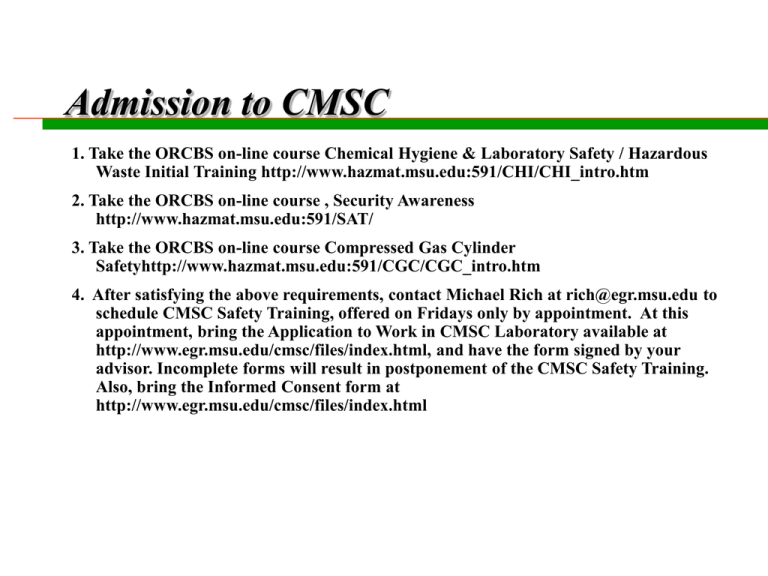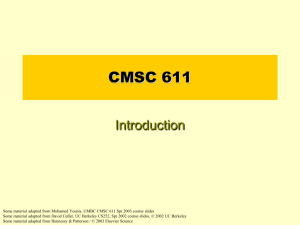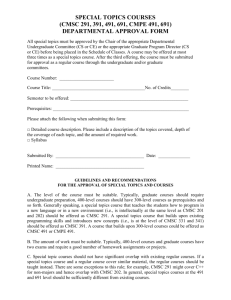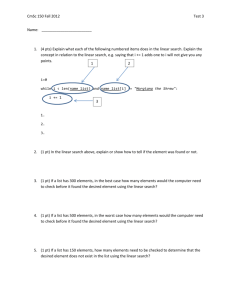Standard Operating Laboratory Procedures
advertisement

Admission to CMSC 1. Take the ORCBS on-line course Chemical Hygiene & Laboratory Safety / Hazardous Waste Initial Training http://www.hazmat.msu.edu:591/CHI/CHI_intro.htm 2. Take the ORCBS on-line course , Security Awareness http://www.hazmat.msu.edu:591/SAT/ 3. Take the ORCBS on-line course Compressed Gas Cylinder Safetyhttp://www.hazmat.msu.edu:591/CGC/CGC_intro.htm 4. After satisfying the above requirements, contact Michael Rich at rich@egr.msu.edu to schedule CMSC Safety Training, offered on Fridays only by appointment. At this appointment, bring the Application to Work in CMSC Laboratory available at http://www.egr.msu.edu/cmsc/files/index.html, and have the form signed by your advisor. Incomplete forms will result in postponement of the CMSC Safety Training. Also, bring the Informed Consent form at http://www.egr.msu.edu/cmsc/files/index.html SAFETY IS YOUR RESPONSIBILITY!! INDIVIDUAL LABORATORY EMPLOYEES ARE RESPONSIBLE FOR THEIR OWN SAFETY. ALL INDIVIDUALS PERFORMING WORK WITH HAZARDOUS SUBSTANCES MUST ACCEPT A SHARED RESPONSIBILITY FOR OPERATING IN A SAFE MANNER ONCE THEY HAVE BEEN INFORMED ABOUT THE EXTENT OF RISK AND SAFE PROCEDURES FOR THEIR ACTIVITIES. THEY ALSO HAVE THE RESPONSIBILITY TO INFORM THEIR SUPERVISORS OF ACCIDENTS AND WORK PRACTICES OR CONDITIONS THEY BELIEVE HAZARDOUS TO THEIR HEALTH OR TO THE HEALTH OF OTHERS. How to Bring Chemicals to CMSC Labs Standard Procedures for Bringing Chemicals and Compounds to CMSC Laboratory This procedure must be completed prior to bringing any compound to CMSC Laboratories. 1. Fill out Chemical Inventory Log-In Sheet, available at http://www.egr.msu.edu/cmsc/files/index.html 2. Send form to Brian Rook, rook@egr.msu.edu 3. On Fridays only, Brian will accept appointments with you to place the item on CMSC inventory. 4. Incomplete forms will be returned and can not be processed. 5. Any item not labeled will be immediately processed for disposal. EVERYTHING MUST HAVE OWNER’S NAME, DATE, AND COMPOUND IDENTITY 5. ON EACH VESSEL, INCLUDING WATER. ALL SECONDARY CONTAINERS MUST BE LABELLED WITH HAZARD LABEL. How to Bring Chemicals to CMSC Labs Form is at http://www.egr.msu.edu/cmsc/files/ChemInventory.pdf Secondary Containers All secondary containers must be labeled with Chemical Name, Date, and Owner, All secondary containers must have NFPA hazard thumb stickers, and have the primary hazard spelled out in words, i.e., "Flammable", " Corrosive", etc...... Instrument Specific Training for CMSC • • • • • Instruction by Supervisor Review Instrument Instruction Manual Identify hazard, (pinch point, hot areas, etc) Independent use on case by case basis Hours of Operation SOP in CMSC • • • • • • • • • Safety Showers and Eye Wash Locations Fire Extinguishers and Fire Alarm Locations Chemical Spill Kits Canopy and Fume Hood Operation Container Identification Waste Disposal Safety Apparel Cleanliness Do not borrow without permission SOP in CMSC • • • • Equipment Reservation Log in your work every time Consumables All New Setups Reviewed by CMSC Safety Comm. (reflux, distillations, modifications, etc.) • Squeeze bottles must only contain identified contents • Report Unsafe Situations and Practices to MIKE RICH or any staff member. Work Protocols Return tools. Purchase your own if you need a tool at your work station. Keep it clean. Dispose of paper towels. Place full trashcans in hallway. If you open a drawer, close it. Label all chemicals. Dispose of them too. Refresh supplies: Al foil, paper towels, light bulbs, gloves, and the like. Glove Regulations Do not leave lab with gloves on. If wearing gloves, do not touch balances, ovens, doorknobs, phones, pc mouse, cabinets, faucets, or other public item where you will cross contaminate a fellow worker. If you smudge something from your gloves, clean it with isopropanol, acetone, etc. Change your gloves frequently. Work Protocols If it is broken inform Mike or staff right away. If you change something, return it to its original configuration (vacuum ovens, drill press, saw…) If it is not yours, don’t use it. Never Ever Debulk Silicone Mold Making Materials in Vacuum Oven. When Finished, Lock the Drill Press, Felkar Saw, and Band Saw. Put keys in envelope, and slide under my door. Work Protocols Keep microscope ports covered. Peroxides must be dated when vessel was opened. Do not remove tools, manuals, supplies, from the labs. CMSC does not archive data. Emergency Procedures Fire—Pull Alarm, and leave bldg. Meet across the street at the pillars if you have information for me. Tornado—go to basement Work Protocols Do Not Loan Your Key Card Do Not Block Open Lab Doors Do Not Give Access to Others Be Courteous and Professional to Colleagues and All Researchers in CMSC Labs Work Protocols Extruder/Injection Molder Operations. You must work in pairs. No solo operations. Purge according to CMSC Procedures. No metal tools around extruder or mold. Sweep the floor. Every pellet to be swept. Put tools away (not on counter). Clean the cooling bath. Your contract will be charged for any cleaning required by CMSC after your use. Report all problems to Mike & Staff. Disciplinary Actions Card will be suspended when there is evidence that an individual is responsible for serious breach of safety protocols Individuals may be required to retake Chemical Safety Training. Serious and repeated infractions will result in review of performance by Director Drzal. The 5 Minute Rule If I am not on phone, and do not have visitor, you may knock on my door for assistance requiring less than 5 minutes of my time. Longer time periods might require an appointment to be scheduled. Be Safe. Be Productive. Be Professional.




